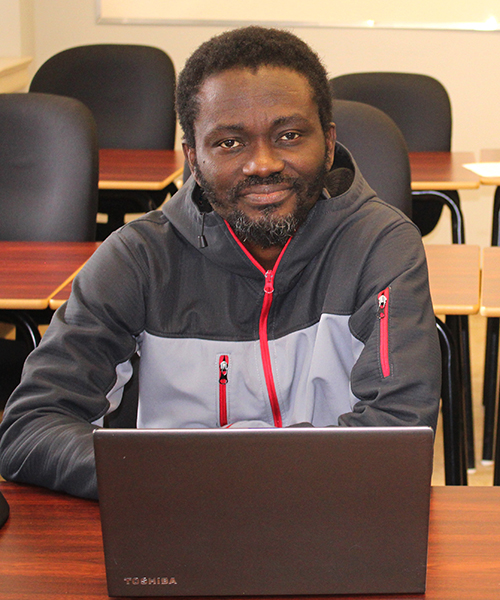
Imagine working on a project that had the potential to save hundreds of thousands of lives. Joseph Marfo Boaheng, a student in the Data Analytics program at Holland College, doesn’t have to. For the past eight years he has been working with Easy Water for Everyone (EWfE), a non-profit, non-governmental organization located in the United States and Ghana with collaborative relationships in Senegal, and Uganda, to monitor the long-term efficacy of an innovative low-cost water filtration system suitable for use in remote villages in countries across Africa. Currently, the project has provided over 20,000 people with clean water in the three project countries, about 1,000 of them children aged five years and younger.
The team’s research has just been published in Scientific Reports, a journal published by Nature Portfolio, with Marfo’s name as lead author. The full article here: Evidence for long‑term efficacy of a membrane filtration device in rural villages in Ghana
Marfo was still living in Ghana when he started working on the project. With a PhD in economics and a master’s degree in epidemiology and biostatistics, he became increasingly interested in data analytics and explored opportunities to study the subject abroad.
“My brother was enrolled in a PhD program at Memorial University in Newfoundland, and he suggested that I look for a program in Atlantic Canada,” he said in a recent interview. “That is how I found this program at Holland College.”
He received an educational leave of absence from his employer, the Easy Water for Everyone Project, and started Holland College’s Data Analytics program in September. He began writing up the results of the water purification study in October using data his team members were reporting.
The filtration system the team are testing was developed by a nephrologist using a polysulfone membrane usually employed in hemodialysis to filter impurities out of blood.
“He thought, if it works for dialysis, why not for water purification? So he tried it in the lab and confirmed that it would trap bacteria,” Marfo explained.
By using the membrane in a water gravity‑powered filtration system, the EWfE team hoped to develop a low-cost but highly effective method to remove pathogenic micro‑organisms from village water systems. Pathogenic micro-organisms increase the risk of infectious gastrointestinal diseases such as diarrhea, which is the second leading cause of death in children under the age of five and was responsible for the deaths of 370,000 children in 2019, according to the World Health Organization.
Because the filtration systems are gravity driven, they are suitable to use in remote regions even if there is no source of electricity available. The systems were installed in villages in Ghana, Senegal, and Uganda, and for four years the research team has been tracking the effectiveness of the systems by comparing the self-reported incidents of diarrhea from households in the villages which have the filtration system with reports from households in villages in the same areas that do not.
Marfo’s work demonstrates how a skilled data analyst can develop a dashboard that streamlines and interprets information in a meaningful way, said Chris Stewart, the program’s learning manager.
“The Data Analytics Post-Graduate program at Holland College is designed to complement the diverse backgrounds of our students, offering advanced insights into data interpretation, statistical analysis, communication, and the latest analytical tools,” he said. “Marfo’s remarkable work with Easy Water for Everyone underscores the significant impact that dedicated individuals can have when they apply a deep understanding of data analytics to real-world challenges. His project serves as a testament to how professionals, even those with substantial prior experience and achievements like Marfo, can further refine their skills and broaden their impact through our program. This synergy between prior accomplishments and new learnings empowers our graduates to contribute even more profoundly to initiatives that make a difference, such as ensuring safe water access for communities in need.”
After he graduates from the one-year program in late May, Marfo hopes to stay here and continue working remotely for the Easy Water for Everyone Project in Ghana. But his work with Easy Water for Everyone isn’t at an end. When the water purification research ends, he intends to volunteer with the organization.
In this picture: Data Analytics student Marfo Boaheng, left, and learning manager Chris Stewart.
For more information, please contact:
Sara Underwood, Media and Communications Officer
Tel: 902-566-9695
Date: March 20, 2024